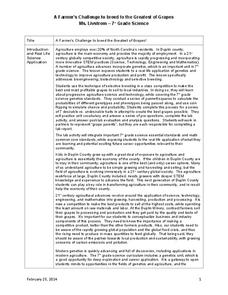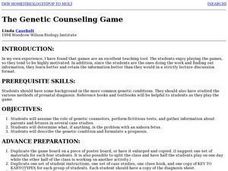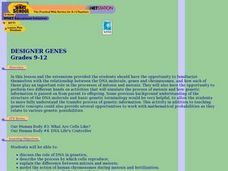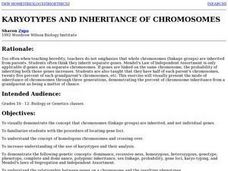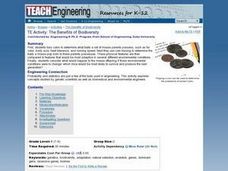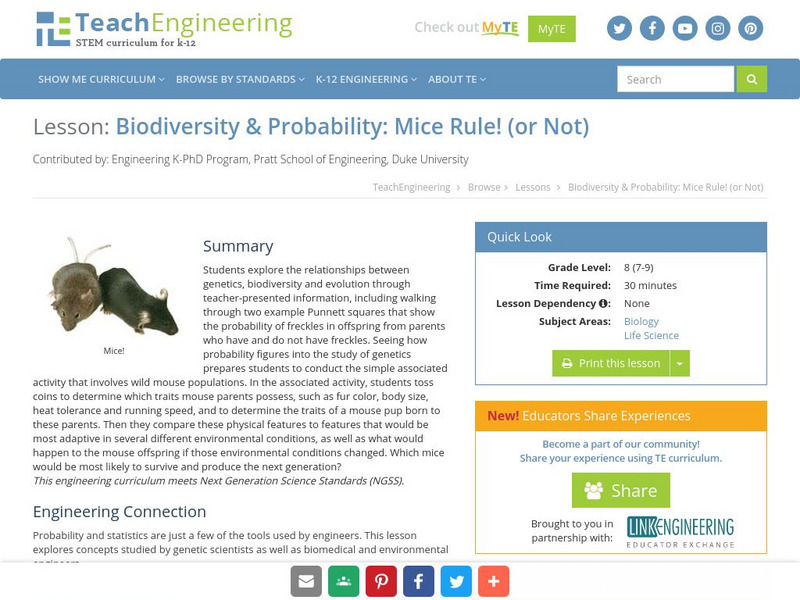US National Library of Medicine
Monster Genetics Lab
Harness young scientists' knowledge of genetics with an engaging science activity. Learners start by flipping a coin to determine the genotypes and phenotypes of two parent monsters, before using Punnett squares to...
Oklahoma State University
Hairy Heredity
Young scholars learn that heredity comes down to the flip of a coin with this cross-curricular math and science lesson. Using smiley faces as a model, students toss coins to determine which dominant or recessive traits...
Kenan Fellows
A Farmer’s Challenge to Breed to the Greatest of Grapes
What does your class know about GMOs? Are they savvy to selective breeding? Challenge young minds to engineer the greatest crop of all time using a hands-on genetics unit. Learners discover the good and bad details of selective breeding,...
Curated OER
Genetics: Who are you?
Study, manipulate, and research genetic traits. Discuss how genetic traits are passed from one generation to another. Classmates explore how they look like their parents and debate whether or not they can do anything about it? They...
Curated OER
Genetics: Mice Rule! (Or Not)
Students explore genetics and evolution by examining a hypothetical mouse population. Using coin tosses, they determine mouse traits of parents and offspring. Finally, they consider the outcomes of changing environmental conditions on...
Curated OER
Teacher Preparation Notes on Genetics
Students explore genetics through various hands-on activities. In this biology lesson, students predict the probability of offspring genotypes and phenotypes using the Punnett Square. They explain the causes of genetic abnormalities.
Curated OER
The Genetic Counseling Game
Students explore genetics and ethical issues. They siimulate the role of genetic counselors, perform fictitious tests, and gather information about parents and fetuses in case studies. Students describe the condition and formulate a...
Curated OER
Probability and Genetics
Students determine the offspring from a genetic cross. In this biology lesson, students use Punnett squares to find probability. They explain how genes are passed from parents to offspring.
Curated OER
50:50 Chances
Third graders reinforce the probability of gender by uising a coin toss, as they continue to search for the answers to genetics questions by using mathematical expectations of probability.
Curated OER
EMS Lesson 2: Outrageous Offspring
Students investigate the principles of probability that can be used to predict hereditary traits.
Curated OER
Designer Genes
High schoolers view a video on DNA. They discuss mitosis, meiosis and fertilization. They use strips of paper to simulate fertilization and analyze the genotype and phenotype of the combined chromosomes.
Curated OER
Karyotypes & Chromosome Inheritance
Students study Mendelian genetic terms, locate and name loci on chromosomes, karyotype construction, inheritance patterns through families.
Curated OER
Karyotypes and Inheritance of Chromosomes
Students explore the mode of inheritance of chromosomes. Given a scenario, students use the Human Genome sheet to determine inherited chromosomes. They illustrate the difference between genotype and phenotype. Students develop a model...
Curated OER
The Benefits of Biodiversity
Students examine the concept of biodiversity. They toss coins to determine what traits mouse parents have and the babies traits as well. They predict what would happen to the baby mice if the traits of the parents were different.
Washington State University
Washington State University: Learning Mendelian Genetics
A decent lab activity which could be used to introduce the concept of dominance and autosomal dominance. This site provides a coin toss activity to learn about Mendelian Genetics.
TeachEngineering
Teach Engineering: The Benefits of Biodiversity
First, students toss coins to determine what traits a set of mouse parents possess, such as fur color, body size, heat tolerance, and running speed. Next they use coin tossing to determine the traits a mouse pup born to these parents...
TeachEngineering
Teach Engineering: Mice Rule! (Or Not)
Students explore the relationships between genetics, biodiversity, and evolution through a simple activity involving hypothetical wild mouse populations. First, students toss coins to determine what traits a set of mouse parents...




